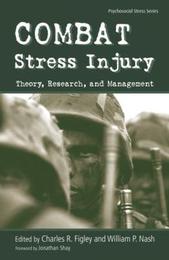
|
Combat Stress Injury: Theory, Research, and Management
Hardback
Main Details
| Title |
Combat Stress Injury: Theory, Research, and Management
|
| Authors and Contributors |
Edited by Charles R. Figley
|
|
Edited by William P. Nash
|
|
Foreword by Jonathan Shay
|
| Series | Routledge Psychosocial Stress Series |
|---|
| Physical Properties |
| Format:Hardback | | Pages:368 | | Dimensions(mm): Height 229,Width 152 |
|
| Category/Genre | Coping with stress |
|---|
| ISBN/Barcode |
9780415954334
|
| Classifications | Dewey:155.9042 |
|---|
| Audience | | Undergraduate | | Postgraduate, Research & Scholarly | | Professional & Vocational | |
|---|
| Illustrations |
16 black & white halftones, 8 black & white line drawings
|
|
Publishing Details |
| Publisher |
Taylor & Francis Ltd
|
| Imprint |
Routledge
|
| Publication Date |
18 December 2006 |
| Publication Country |
United Kingdom
|
Description
Combat Stress Injury represents a definitive collection of the most current theory, research, and practice in the area of combat and operational stress management, edited by two experts in the field. In this book, Charles Figley and Bill Nash have assembled a wide-ranging group of authors (military / nonmilitary, American / international, combat veterans / trainers, and as diverse as psychiatrists / psychologists / social workers / nurses / clergy / physiologists / military scientists). The chapters in this volume collectively demonstrate that combat stress can effectively be managed through prevention and training prior to combat, stress reduction methods during operations, and desensitization programs immediately following combat exposure.
Author Biography
Charles R. Figley, Ph.D., CT, MT, is President and Founder of the Green Cross Foundation and Professor at the School of Social Work at Florida State University. He is founder and director of the FSU Traumatology Institute (formerly the Psychosocial Stress Research and Development Program). He is an elected Fellow of the APA, APS, AAMFT, the American Association for the Applied Psychology, and the American Orthopsychiatric Association. Figley is the Founding President of the International Society for Traumatic Stress Studies (ISTSS). He is a longtime Taylor & Francis author, and currently serves as the consulting editor of the Psychosocial Stress Series. William P. Nash, M.D., is a Captain, Medical Corps, United States Navy, and Operational Stress Control and Readiness (OSCAR) Program Psychiatrist, 1st Marine Division, Camp Pendleton, CA. Dr. Nash is also an Assistant Clinical Professor of Psychiatry, UC San Diego
Reviews"!Charles Figley and William P. Nash have made a significant and cogent contribution that helps to frame combat stress injury and interventions in a refreshing and helpful paradigm. Figley and Nash have done an impressive job of arraying 30 professionals whose contributions help frame the complex interplay of the mental and emotional wounds that too often result from the trauma of combat, and these authors identify ways to prevent and/or manage the potential consequences of operational deployments. The editors have challenged their contributors to help military commanders by providing those leaders, who bear primary responsibility for the welfare of their war fighters, with the necessary tools to help preserve the fighting strength and protect the long-term health of them military member and his or her family. On all accounts, Figley and Nash have powerfully and significantly achieved what they set out to do. To effectively position health-care providers, the clergy, and commanders to handle [the] collective expression of operational fatigue and stress, Figley and Nash offer the right paradigm at the right time." - Thomas J. Williams, PsycCRITIQUES, Contemporary Psychology: APA Review of Books "Both editors of Combat Stress Injury have boots-on-the-ground military experience, as well as being a practicing psychologist (Figley) and physician (Nash), and it shows in their selection of chapters addressing PTSD and related mental health syndromes associated with combat. This book is a great place to start for professionals who are serious about understanding the unique tribulations of our uniformed service members who live with the prospect of death and disablement to preserve what we all value." - Laurence Miller, PhD, International Journal of Emergency Mental Health
|